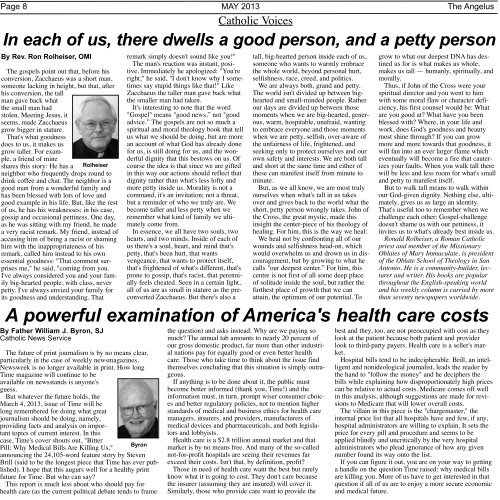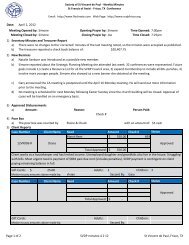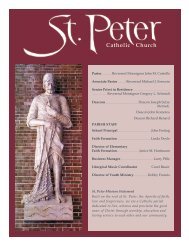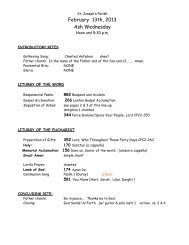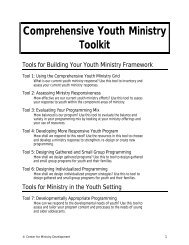You also want an ePaper? Increase the reach of your titles
YUMPU automatically turns print PDFs into web optimized ePapers that Google loves.
Page 8 MAY <strong>2013</strong> The <strong>Angelus</strong><br />
Catholic Voices<br />
In each of us, there dwells a good person, and a petty person<br />
By Rev. Ron Rolheiser, OMI<br />
The gospels point out that, before his<br />
conversion, Zacchaeus was a short man,<br />
someone lacking in height, but that, after<br />
his conversion, the tall<br />
man gave back what<br />
the small man had<br />
stolen. Meeting Jesus, it<br />
seems, made Zacchaeus<br />
grow bigger in stature.<br />
That's what goodness<br />
does to us, it makes us<br />
grow taller. For exam-<br />
ple, a friend of mine<br />
shares this story: He has a<br />
Rolheiser<br />
neighbor who frequently drops round to<br />
drink coffee and chat. The neighbor is a<br />
good man from a wonderful family and<br />
has been blessed with lots of love and<br />
good example in his life. But, like the rest<br />
of us, he has his weaknesses; in his case,<br />
gossip and occasional pettiness. One day,<br />
as he was sitting with my friend, he made<br />
a very racist remark. My friend, instead of<br />
accusing him of being a racist or shaming<br />
him with the inappropriateness of his<br />
remark, called him instead to his own<br />
essential goodness: "That comment surprises<br />
me," he said, "coming from you.<br />
I've always considered you and your family<br />
big-hearted people, with class, never<br />
petty. I've always envied your family for<br />
its goodness and understanding. That<br />
By Father William J. Byron, SJ<br />
Catholic News Service<br />
The future of print journalism is by no means clear,<br />
particularly in the case of weekly newsmagazines.<br />
Newsweek is no longer available in print. How long<br />
Time magazine will continue to be<br />
available on newsstands is anyone's<br />
guess.<br />
But whatever the future holds, the<br />
March 4, <strong>2013</strong>, issue of Time will be<br />
long remembered for doing what great<br />
journalism should be doing, namely,<br />
providing facts and analysis on important<br />
topics of current interest. In this<br />
case, Time's cover shouts out, "Bitter<br />
Byron<br />
Pill: Why Medical Bills Are Killing Us,"<br />
announcing the 24,105-word feature story by Steven<br />
Brill (said to be the longest piece that Time has ever published).<br />
I hope that this augurs well for a healthy print<br />
future for Time. But who can say?<br />
This report is much less about who should pay for<br />
health care (as the current political debate tends to frame<br />
remark simply doesn't sound like you!"<br />
The man's reaction was instant, positive.<br />
Immediately he apologized: "You're<br />
right," he said, "I don't know why I sometimes<br />
say stupid things like that!" Like<br />
Zacchaeus the taller man gave back what<br />
the smaller man had taken.<br />
It's interesting to note that the word<br />
"Gospel" means "good news,” not "good<br />
advice.” The gospels are not so much a<br />
spiritual and moral theology book that tell<br />
us what we should be doing, but are more<br />
an account of what God has already done<br />
for us, is still doing for us, and the wonderful<br />
dignity that this bestows on us. Of<br />
course the idea is that since we are gifted<br />
in this way our actions should reflect that<br />
dignity rather than what's less lofty and<br />
more petty inside us. Morality is not a<br />
command, it's an invitation; not a threat,<br />
but a reminder of who we truly are. We<br />
become taller and less petty when we<br />
remember what kind of family we ultimately<br />
come from.<br />
In essence, we all have two souls, two<br />
hearts, and two minds. Inside of each of<br />
us there's a soul, heart, and mind that's<br />
petty, that's been hurt, that wants<br />
vengeance, that wants to protect itself,<br />
that's frightened of what's different, that's<br />
prone to gossip, that's racist, that perennially<br />
feels cheated. Seen in a certain light,<br />
all of us are as small in stature as the preconverted<br />
Zacchaeus. But there's also a<br />
tall, big-hearted person inside each of us,<br />
someone who wants to warmly embrace<br />
the whole world, beyond personal hurt,<br />
selfishness, race, creed, and politics.<br />
We are always both, grand and petty.<br />
The world isn't divided up between bighearted<br />
and small-minded people. Rather<br />
our days are divided up between those<br />
moments when we are big-hearted, generous,<br />
warm, hospitable, unafraid, wanting<br />
to embrace everyone and those moments<br />
when we are petty, selfish, over-aware of<br />
the unfairness of life, frightened, and<br />
seeking only to protect ourselves and our<br />
own safety and interests. We are both tall<br />
and short at the same time and either of<br />
these can manifest itself from minute to<br />
minute.<br />
But, as we all know, we are most truly<br />
ourselves when what's tall in us takes<br />
over and gives back to the world what the<br />
short, petty person wrongly takes. John of<br />
the Cross, the great mystic, made this<br />
insight the center-piece of his theology of<br />
healing. For him, this is the way we heal:<br />
We heal not by confronting all of our<br />
wounds and selfishness head-on, which<br />
would overwhelm us and drown us in discouragement,<br />
but by growing to what he<br />
calls "our deepest center.” For him, this<br />
centre is not first of all some deep place<br />
of solitude inside the soul, but rather the<br />
furthest place of growth that we can<br />
attain, the optimum of our potential. To<br />
the question) and asks instead: Why are we paying so<br />
much? The annual tab amounts to nearly 20 percent of<br />
our gross domestic product, far more than other industrial<br />
nations pay for equally good or even better health<br />
care. Those who take time to think about the issue find<br />
themselves concluding that this situation is simply outrageous.<br />
If anything is to be done about it, the public must<br />
become better informed (thank you, Time!) and the<br />
information must, in turn, prompt wiser consumer choices<br />
and better regulatory policies, not to mention higher<br />
standards of medical and business ethics for health care<br />
managers, insurers, and providers, manufacturers of<br />
medical devices and pharmaceuticals, and both legislators<br />
and lobbyists.<br />
Health care is a $2.8 trillion annual market and that<br />
market is by no means free. And many of the so-called<br />
not-for-profit hospitals are seeing their revenues far<br />
exceed their costs. Isn't that, by definition, profit?<br />
Those in need of health care want the best but rarely<br />
know what it is going to cost. They don't care because<br />
the insurer (assuming they are insured) will cover it.<br />
Similarly, those who provide care want to provide the<br />
grow to what our deepest DNA has destined<br />
us for is what makes us whole,<br />
makes us tall — humanly, spiritually, and<br />
morally.<br />
Thus, if John of the Cross were your<br />
spiritual director and you went to him<br />
with some moral flaw or character deficiency,<br />
his first counsel would be: What<br />
are you good at? What have you been<br />
blessed with? Where, in your life and<br />
work, does God's goodness and beauty<br />
most shine through? If you can grow<br />
more and more towards that goodness, it<br />
will fan into an ever larger flame which<br />
eventually will become a fire that cauterizes<br />
your faults. When you walk tall there<br />
will be less and less room for what's small<br />
and petty to manifest itself.<br />
But to walk tall means to walk within<br />
our God-given dignity. Nothing else, ultimately,<br />
gives us as large an identity.<br />
That's useful too to remember when we<br />
challenge each other: Gospel-challenge<br />
doesn't shame us with our pettiness, it<br />
invites us to what's already best inside us.<br />
Ronald Rolheiser, a Roman Catholic<br />
priest and member of the Missionary<br />
Oblates of Mary Immaculate, is president<br />
of the Oblate School of Theology in San<br />
Antonio. He is a community-builder, lecturer<br />
and writer. His books are popular<br />
throughout the English-speaking world<br />
and his weekly column is carried by more<br />
than seventy newspapers worldwide.<br />
A powerful examination of America's health care costs<br />
best and they, too, are not preoccupied with cost as they<br />
look at the patient because both patient and provider<br />
look to third-party payers. Health care is a seller's market.<br />
Hospital bills tend to be indecipherable. Brill, an intelligent<br />
and nonideological journalist, leads the reader by<br />
the hand to "follow the money" and he deciphers the<br />
bills while explaining how disproportionately high prices<br />
can be relative to actual costs. Medicare comes off well<br />
in this analysis, although suggestions are made for revisions<br />
to Medicare that will lower overall costs.<br />
The villain in this piece is the "chargemaster," the<br />
internal price list that all hospitals have and few, if any,<br />
hospital administrators are willing to explain. It sets the<br />
price for every pill and procedure and seems to be<br />
applied blindly and uncritically by the very hospital<br />
administrators who plead ignorance of how any given<br />
number found its way onto the list.<br />
If you can figure it out, you are on your way to getting<br />
a handle on the question Time raised: why medical bills<br />
are killing you. More of us have to get interested in that<br />
question if all of us are to enjoy a more secure economic<br />
and medical future.


